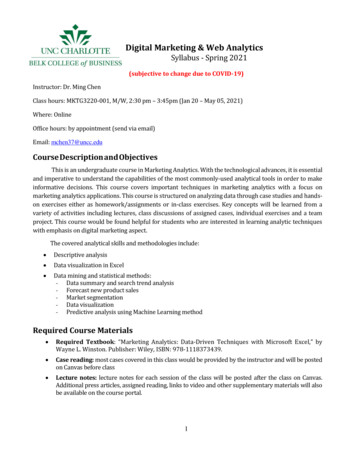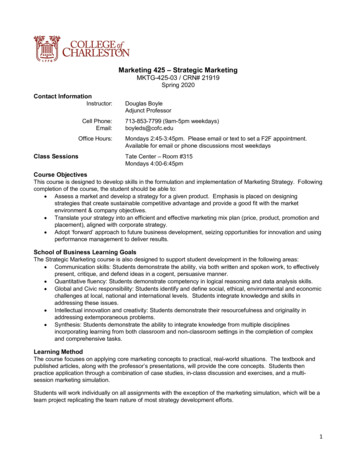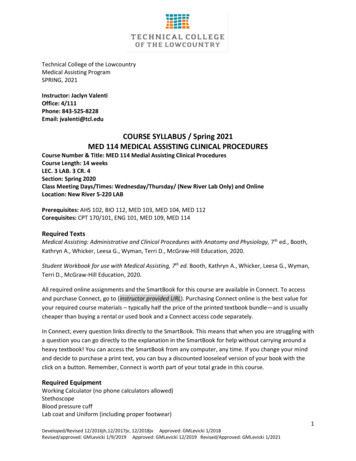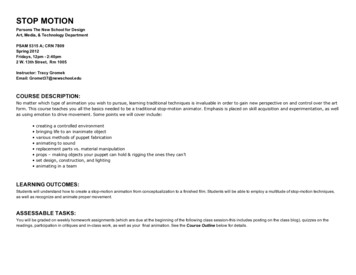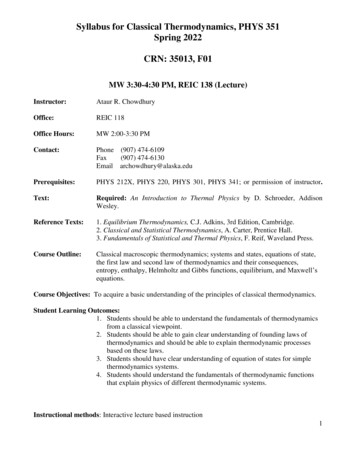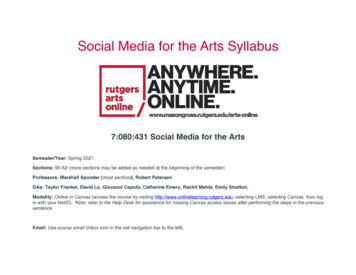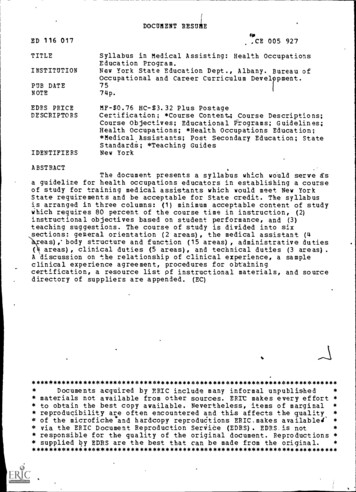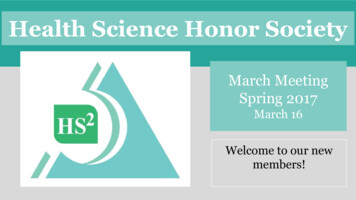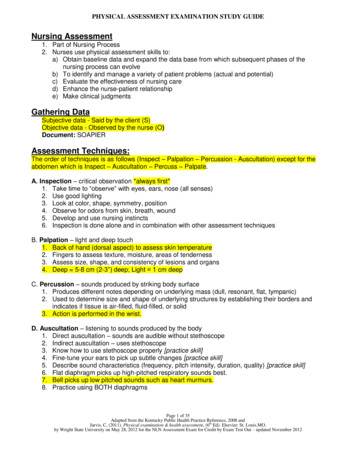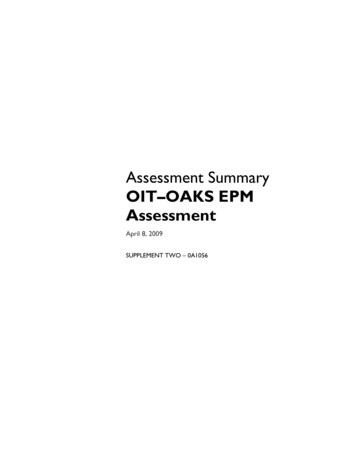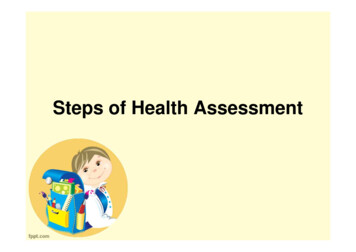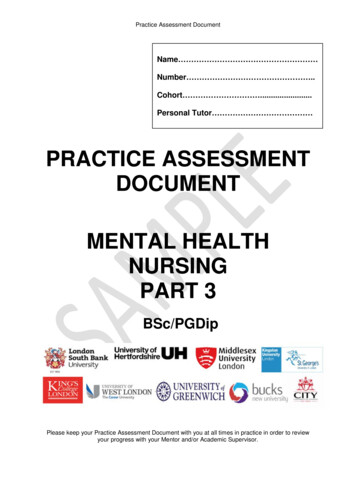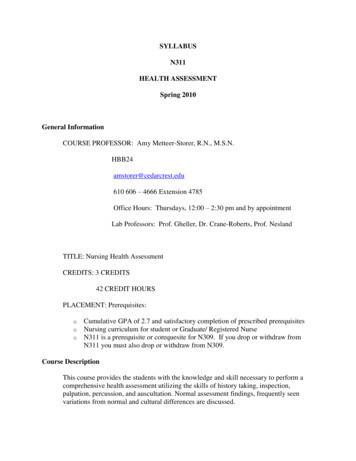
Transcription
SYLLABUSN311HEALTH ASSESSMENTSpring 2010General InformationCOURSE PROFESSOR: Amy Metteer-Storer, R.N., M.S.N.HBB24amstorer@cedarcrest.edu610 606 – 4666 Extension 4785Office Hours: Thursdays, 12:00 – 2:30 pm and by appointmentLab Professors: Prof. Gheller, Dr. Crane-Roberts, Prof. NeslandTITLE: Nursing Health AssessmentCREDITS: 3 CREDITS42 CREDIT HOURSPLACEMENT: Prerequisites:oooCumulative GPA of 2.7 and satisfactory completion of prescribed prerequisitesNursing curriculum for student or Graduate/ Registered NurseN311 is a prerequisite or corequesite for N309. If you drop or withdraw fromN311 you must also drop or withdraw from N309.Course DescriptionThis course provides the students with the knowledge and skill necessary to perform acomprehensive health assessment utilizing the skills of history taking, inspection,palpation, percussion, and auscultation. Normal assessment findings, frequently seenvariations from normal and cultural differences are discussed.
Course ObjectivesUpon successful completion of the course, the student will:1. Demonstrate history-taking and interviewing skills necessary for comprehensive datacollection.2. Demonstrate beginning level skill in the techniques of physical exam: inspection,palpation, percussion, and auscultation.3. Differentiate between normal and abnormal assessment findings.4. Apply relevant anatomy and physiology to the health assessment process.5. Integrate health assessment into the nursing process and nursing practice.6. Describe how cultural/ethnic differences influence the findings in a health assessment.7. Explain how assessment techniques vary across the lifespan.Teaching MethodsONLINE TEACHING METHODS: Online audio lectures, lecture notes, power points,audio-visuals, interactive exercises, readings and optional websitesLAB TEACHING METHODS: Audiovisuals, demonstration, practiceAssessment Responsibilities & ExpectationsAssessment is an effective teaching strategy for student learners to practice the role of the nurseand develop empathy in the role of the patient. The expectation of the clinical lab is that maleand female undergraduate student learners enrolled in NUR311 act as patients for their peers topractice assessments on and then write-up those assessments and submit them for a grade eachweek. Student learners acting in the role of the nurse need to maintain respect and privacy of thestudent learner acting in the role of the patient during the practice of assessment skills.Dress Code:Students will wear a patient gownShorts under the hospital gown andSports bra under the hospital gownPhysical Interaction:Students should expect to practice the required assessments listed in the syllabus. There is a needto touch each other in a respectful way when learning how to assess the systems. The studentwill complete the breast assessment on themselves in the privacy of their own home.Disclosure of Personal Medical Information:Student learners will also practice with partners mental and physical status evaluations includingvital signs, etc. Practice evaluations might result in disclosure of personal medical information.
If a student anticipates feeling uncomfortable with these requirements, she/he is encouraged tospeak with the clinical and/or course faculty.Required EquipmentStethoscopeGrading PoliciesEVALUATION:ooooTwo written exams (20% each) 40%Final written exam 25%Final laboratory Practicum 20% *Laboratory practice assignments and quizzes 15%Total 100%o *A minimum grade of 73% must be achieved on the Practicum to pass the courseregardless of other grades in the course.Only final grades will be rounded.Attendance - Students who are absent or late to class may have points taken off of thedaily assignment and are responsible for scheduling NLRC time with Mrs. Seaman toview the videos and then practice independently and then complete assessment on apeer in the NLRC. All time missed must be made up in this way prior to the nextlab.ExamsThere are two exams and a final exam for the online theory portion of the course and afinal practicum exam for the lab which must be taken as scheduled.Strategies for success:Use the study guides located in Document Sharing.Attend exams as scheduled as exams not taken when scheduled will result ina ZERO for the exam.Discuss extenuating circumstances with me in advance! Make-up writtenexaminations will be given at the professor’s and student’s convenience.All theoretical exams are paper and pencil at designated testing times. Come ontime!Bring pencils and erasers to exams. These are the only items you can have atyour table during the exam. All exams are closed book, no notes.
Make-up examinations for the final practicum examination require paymentof a 50.00 fee and will not be given without documentation such as from anemergency room or physician documenting due cause as to why the studentmissed their final practicum exam. If the reason is due to the illness of astudent’s child documentation from the child’s physician must be submitted.The exam must be made up in a minimum of time as determined by theProfessor. There are no exceptions to any of the above.Exam Review PolicyExam I – you will receive a written content review of the 30% most missedquestions.Exam 2 – you will receive a written content review of the top 30% of contentareas missed.Final Exam – prior to the final exam an audio review in preparation for the finalexam will be available online and may be viewed as many times as the studentchooses.Quizzes – The weekly quiz may be reviewed with the correct answers boldedTuesday, Wednesday, Thursday, or Friday following the close of each quiz. Clickon “Quiz Review” in the left hand margin under each section.PracticumThe Practicum is the final laboratory exam in which the student does a physical exam ona peer. Guidelines for the practicum may be found on Document Sharing and a video ofthe complete practicum is located on the left margin menu of the course.*To pass the course you must achieve a 73% or greater on the practicum. If you fail toachieve this you will not pass the course regardless of your other grades in the course.The practicum is the final exam for the lab. Should you have extenuatingcircumstance which require a make-up examination for the final practicum,a of a 50.00 fee will be required and the make-up examination will not begiven without documentation such as from an emergency room or physiciandocumenting due cause as to why the student missed their final practicumexam. If the reason is due to the illness of a student’s child documentationfrom the child’s physician must be submitted. The exam must be made up ina minimum amount of time as determined by the Professor. There are noexceptions to any of the above.Strategies for success:Practice, practice, practice!
View the video often!Lab SessionsLab time will be spent on demonstration and practice of techniques.Students willbe expected to read textbook assignments prior to completing each module of the onlinecourse. Written assignments and assigned quizzes must be completed prior to thescheduled lab for that section. A zero will be given for any assignment not completedprior to lab. Written assignments must be turned in at the beginning of lab on theassigned due dates. Students will be signed off on vitals signs in this lab. If you have notsuccessfully signed off on vital signs by your first clinical day during which you will bedoing a bed bath. Students having difficulty may be required to practice outside of labtime in the NLRC by their Lab Professor.Strategies for success:Attend all lab sessions – they are mandatory! Failure to attend will result in loss ofpoints on daily assignments. Failure to notify your lab professor in advance of anabsence or failure to make arrangements to makeup that lab may result in a 0 for your labassignment for that day.Should you miss a lab you must contact your Lab Professor in advance, and then prior toyour next lab you must do the following: Contact Mrs. Seaman, Lab Coordinator, byemail and set up a time for her to show the video and you must make-up the 3 hours oflab that you missed doing the assessment on a peer willing to come to lab with you,practicing vital signs or listening to heart sounds, or other activities related to applicationand practice of your health assessment skills. This time may not be used to study, orwork on course work in other classes. The time must be documented and signed bystaff. If this is not completed you will receive a zero for the quiz and assessment for thelab missed which totals 3% of your grade.Be on time! Being late to lab is disruptive to your peers and will result in loss of pointson your daily assignments.Turn lab assignments in on time! Late lab assignments will have an automatic 5 pointstaken off for each day that it is late.Practice your assignment on your peer and allow them to practice the assignment onyou. This is what the lab is all about! Lack of participation in the practice skills orunprofessional behavior may result in loss of points on the written assignment for thatday and in fact may result in full loss of points for that day based on the lab professor’s
assessment. Consistent failure to participate in assessing your lab partner or beingassessed by your lab partner will result in failure of the course.Bring a blank “sloppy copy” of the daily lab write-up, they are found in DocumentSharing, and complete this in lab. Complete a new, neat, final copy to turn in to your LabProfessor.Do your own work. The written report must be your own work, plagiarism on writtenwork as well as any course work will result in failure of the course, please refer to thestudent handbook. Failure to follow the above may result in the student receiving a zero.Bring your stethoscope. It is expected that the student will bring their own stethoscopeto those labs that require the use of a stethoscope.Dress appropriately for the system being assessed. It is expected that students be dressedappropriately for the system being assessed or don a patient gown so that their partnermay assess them. Failure to do so will also result in loss of points from that lab day'sassignment. Consistent failure to participate in assessing your lab partner or beingassessed by your lab partner will result in failure of the course. Equipment other thanyour stethoscope will be provided in lab. Students may use their peers for the finalpracticum examination. No children may be used.Ask permission to tape record any portion of the course including the audio lectures.Taping is only permitted if the faculty member or speaker gives you their approval.AttendanceWritten Exams: Attend exams as scheduled as exams not taken when scheduledwill result in a ZERO for the exam.Final Practicum Exam:Make-up examinations for the final practicumexamination require payment of a 50.00 fee and will not be given withoutdocumentation such as from an emergency room or physician documenting duecause as to why the student missed their final practicum exam. If the reason isdue to the illness of a student’s child documentation from the child’s physicianmust be submitted. The exam must be made up in a minimum of time asdetermined by the Professor. There are no exceptions to any of the above.Weekly Online QuizzesDuring the semester there will be 9 – 10 online quizzes. The quiz must be taken prior tothe student’s lab for that topic. Failure to do so will result in a 0. Quizzes will be timelimited but you may use your books and notes. You may not have the assistance ofanyone else or print quizzes and should you do so it will be a violation of academic
integrity and the Honor Code and will result in failure of the course as per theconsequences for such a violation in the Cedar Crest College policy.The quizzes are secured with Exam Guard. Should you have technical problems, call theComputer Help Desk or Information Technology for assistance.Strategies for Success:Take your quiz before lab! Don’t wait until the last minute. There may becomputer difficulties so take your quiz soon enough to be able to call forcomputer help if you need it. The Computer Help Desk is open until 8:00 pm.You may also call Information Technology. They are available from 8:30 am –4:00 pm.If you have problems that are computer related, call the Computer Help Desk orInformation Technology as soon as possible.Practice Laboratory AssignmentsWritten assignments will be due as listed in this syllabus unless your lab professor changesthe date. Students will be required to put in writing the assessment data they identified on aperson they assess and turn it in the week after the lab unless otherwise specified by the LabProfessor. All written assignments and quizzes will be talliedtogether and be worth 15% ofthe final grade. Assignments are due on the day(s) indicated by the instructor. Failure to handin a written assignment on the date due without speaking to the instructor will result in theloss of five points for each day the assignment is late. Failure to complete a quiz prior toyour lab on that topic will result in a 0 on that quiz.Strategies for success:Print a “sloppy copy” before lab. Written assignments/lab guidelines may be found inDocument Sharing. A draft should be completed in lab, and formal neat copy completedduring the week to turn in the following week. Final copies that are not neat and legiblewill not be accepted and will result in a zero for the assignment.Be concise but specific. Data on the worksheets must be concise yet very specific.Vague wording is not acceptable.Use correct medical terminology and spell it correctly. Correct spelling can be found inyour text.Describe exactly what was seen, heard or felt during the exam. Acceptable: Skin - pinkwithout erythema or cyanosis. Unacceptable: Skin - color good. Also unacceptable areterms such as normal, within normal limits, WNL.All areas of the worksheet must be completed regardless of the findings. For example,when assessing the lymphatic system and there are no palpable nodes,the correct way toindicate this would be to write, "no nodes palpable". If something does not apply to yourpatient, you would document N/A.Correct terminology is to be used at all times. The use of slang or abbreviations isunacceptable.
Points will be deducted for incorrect grammar and spelling errors. Correct spelling ofmedical terminology can be found in your text. You may lose up to full points for eachquestion with spelling or grammatical errors.Please contact the Lab Professor if there are any questions or problems with writtenassignments, if you are ill, and if therefore you need to attend another lab for make-up asdiscussed above.Please contact me for any questions regarding quizzes, exams, and any questionsregarding the Online Course. Contact your lab professor for questions regarding the lab.Communicate with me! If you are having a problem this is the only way I will know.EMAIL POLICYEmail must be checked 5 days a week and always the morning of your scheduledN311 lab.GRADING SCALE:93 - 100 A73 - 76 C90 - 92 A-70 - 72 C-87 - 89 B 67 - 69 D 83 - 86 B60 - 66 D80 - 82 B-Below 60 F77 - 79 C **A minimum grade of "C " in this course is needed to satisfy the requirements of thenursing major.Honor CodePlease refer to your Student Handbook, for a detailed explanation of the Cedar Crest CollegeHonor Policy. It is your responsibility to be familiar with this policy. The student shares with thefaculty the responsibility for maintaining the integrity of scholarship, grades, and professionalstandards. The Honor Code will prevail at all times. Violations of the Honor Code which occurduring this course will result in failure of the course.Plagiarism STATEMENT: It is dishonest to present oral or written work that is not entirely thestudent’s own. Any language taken from another source, whether individual words or entireparagraphs, must be placed within quotation marks and attributed to the source, following theAPA format. Paraphrased material from an outside source must also be attributed. (StudentHandbook, CCC, 2004-2005)The Cedar Crest College Nusing Department Faculty agrees to define plagarism as, "A writer'sdeliberate use of someone else's language, ideas, or other original (not common knowledge)
material without acknowledging its source".Plagarism of another person's work on exams, assignments including health assessment lab writeups, concept maps or process recordings is considered a violation of the Honor Code. A copy ofthe Student Handbook (See A Student's Guide, Cedar Crest College or the web sitewww.cedarcrest.edu.)Plagiarism of any kind will result in a ZERO for the work and may cause the student to fail thecourse. This includes all written work such as the weekly assessment guidelines.Appropriate classroom and clinical behavior is implicit in the Cedar Crest Honor code. Suchbehavior is defined and guided by complete protection for the rights of all students and faculty toa courteous and respectful classroom environment. These behaviors include, but are not limitedto: distractions such as late arrivals, early departures, inappropriate conversations, use of cellphones and pagers, use of weapons, presence of children in the classroom or lab, lack ofaccountability for one's actions, inappropriatecommunication with faculty, staff, peers, members of the health care team, not followingdirection of clinical or classroom faculty, and any other behaviors that might disrupt instructionand/or compromise learner's access to their Cedar Crest College education. Display of thesebehaviors can result in dismissal from the nursing program and the college.Students will follow the Cedar Crest College HONOR CODE policy at all times. Graphic andphotographic images contained in this online course are intended for the use of enrolledregistered students only. Students may not download and/or print any exams, quizzes or otherevaluative materials from the course or distribute such materials to others and doing so will be aviolation of academic integrity and failure of the course.NOTE: The student is reminded that knowledge in Nursing is cumulative and that she/he will beheld accountable for prior learning. This includes knowledge of anatomy, physiology, chemistry,math, microbiology, psychology, sociology, lifespan development, and health assessment as theyrelate to material covered in this course.OTHER STUDENT RESPONSIBILITIES: Students are required to keep a hard copy andelectronic copy of all written work and all written work that is graded for this course.Students with documented disabilities who may need academic accommodations should discussthese needs with their professors during the first 2 weeks of class. Students with disabilities whowish to request accommodations should contact Academic Services.Students are obligated to check their e-mail on a daily basis for any changes to classroom/clinicalpacing, assignments and schedules.
Peer tutoring is free! Contact Academic Services.Inclement Weather or Illness: Please call Inclement Weather Hotline. Information can be foundon the CCC website.Required TextsWeber & Kelley Health Assessment in Nursing 4rd Edition Philadelphia: LippincottWilliams & Wilkins with online portion (must be purchased together).*The text should be purchased in the Cedar Crest College Bookstore as it will then includeaccess to the online portion of this course.Classroom Protocol and Professional Classroom BehaviorsSection A or A Student’s Guide to Cedar Crest College contains a section on classroomprotocol. Professional Classroom Behaviors that are required for this course include noelectronic devices may be used in class including cell phones and pagers, no threats orharassment of any kind, no sleeping in class, no working on homework for other classes, noeating/drinking in class, or disruptive arguing with faculty or other class members. Thefollowing list was student driven and also applies.1. Rep
TITLE: Nursing Health Assessment CREDITS: 3 CREDITS 42 CREDIT HOURS PLACEMENT: Prerequisites: o Cumulative GPA of 2.7 and satisfactory completion of prescribed prerequisites o Nursing curriculum for student or Graduate/ Registered Nurse o N311 is a prerequis
